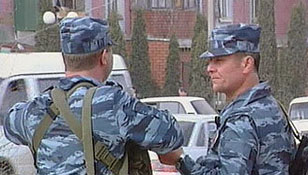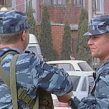
Crisis Looms for Moscow’s Policies in the Northwest Caucasus
Publication: Eurasia Daily Monitor Volume: 7 Issue: 110
By:

On June 6, the Caucasus Times reported a massive influx of Russian security forces into Kabardino-Balkaria. According to the website, an estimated 2,000 servicemen were deployed overnight in the republic, with the principal city of Kabardino-Balkaria, Nalchik, being patrolled by Russian military intelligence (Glavnoye Razvedyvatel’noye Upravleniye–GRU) personnel in plain clothes. The local population was reportedly frightened by the sudden and officially unexplained stepping up of security (www.caucasustimes.com, June 6).
Kabardino-Balkaria has seen a steady rise in violence over the past several months, and the quiet deployment of additional troops in the republic may be a response. The increased presence of security services in the region is likely to be part of the “special complex preventive regime” that was announced on May 28. Even though this special regime is formally not equal to a counter-terrorism operation, in practice it will give the security services even more unchecked powers to interfere in public life. In turn, the higher visibility of the troops and their likely violations of law may contribute to an increase in public anger, rather than ward off the security threats.
Some observers have noted that the so called dual-named republics have been facing a crisis in the North Caucasus. Indeed, Kabardino-Balkaria and Karachaevo-Cherkessia both have been hit hard by a destabilization trend that still seems to be intensifying. The main problem for both these republics is largely the same as in the other North Caucasian republics –a lack of public participation in political life, monopoly over political power and economic resources and the consequent failure of Moscow and its puppet local authorities to resolve various emerging conflicts. However, there are also specific details for Kabardino-Balkaria and Karachaevo-Cherkessia. Rising Circassian political activism is one of these unique factors. Circassian activists are trying to use the attention being paid internationally to preparations for the Winter Olympics in Sochi in 2014 to advance their essential political goals.
On June 5, an extraordinary assembly of the Circassian people in Cherkessk, Karachaevo-Cherkessia adopted a special resolution demanding the break-up of Karachaevo-Cherkessia and the creation of a single Circassian republic. The Circassians accused the Karachays of usurping all of the top positions in politics, the economy and education in the republic and suggested correcting that by creating a Circassian republic within the Russian Federation. They also rebuked Moscow for failing to deliver rule of law and equal rights to the people living in Karachaevo-Cherkessia (www.kavkaz-uzel.ru, June 6).
The move is likely to resonate with the Circassians living in neighboring Kabardino-Balkaria and Adygea, as delegations from both these republics were present at the rally in Cherkessk. While previous attempts by the Circassians to separate from the Karachays failed, Moscow may be more responsive to the Circassians’ demands this time, given that the situation is pointing toward an increased likelihood of full-scale destabilization.
The Circassians strengthened their demands by appealing to the government to resolve two high profile murders of their activists, Aslan Zhukov in March, and, Fral Shebzukhov in May. Zhukov was a popular and flamboyant young campaigner, while Shebzukhov was an advisor to the republic’s president, Boris Ebzeyev, and a likely candidate for the post of Karachaevo-Cherkessia’s prime minister. Both murders are widely regarded as politically motivated. The governmental authorities have reportedly shown little enthusiasm to conduct an energetic and quick investigation (www.kavkaz-uzel.ru, June 6). As often happens in the North Caucasus, the results of such investigations may themselves be quite explosive, so the government may well have a vested interest in not solving the crimes.
On June 3, Karachaevo-Cherkessia’s parliament bowed to pressure by the Russian presidential envoy to the North Caucasus, Aleksandr Khloponin, and confirmed Muradin Kemov, an ethnic Circassian, as the Prime Minister of Karachaevo-Cherkessia. The appointment took place one month after the deadline set by Khloponin, who had unequivocally told the republican president Ebzeyev to appoint a Circassian to head the government of the republic, in order to keep the ethnic balance in this multi-ethnic region (www.kavkaz-uzel.ru, June 3).
The combined Cherkess and Abaza populations comprise only about 19 percent of tiny Karachay-Cherkessia, which has a total population of just under a half million. In addition, the Abaza people are linguistically closer to the Abkhaz than to the Circassians proper. Despite the relatively small numbers of Circassians in Karachaevo-Cherkessia, they are capable of causing significant disruption in the North Caucasus, especially given their generally precarious situation across the region. Kabardino-Balkaria’s population is close to one million, a majority of which consists of Kabardinians. Circassians comprise only 24 percent of Adygea’s population of 500,000, but the territory is in close proximity to the sites of the Sochi Olympics (www.perepis2002.ru).
Moscow would certainly like to see friendly people surrounding the Sochi Olympics rather than exasperated minorities. As experience has shown elsewhere in the Caucasus, Moscow, with all its overwhelming military capabilities, has never been able to secure peace and stability on a given territory without having a benevolent local population. This means that the Circassians are likely to extract some concessions from Moscow as the security situation deteriorates further in the region and the Sochi Olympics project moves on. Of course, Moscow is likely to offer concessions that could easily be scrapped once the Olympics are over.




